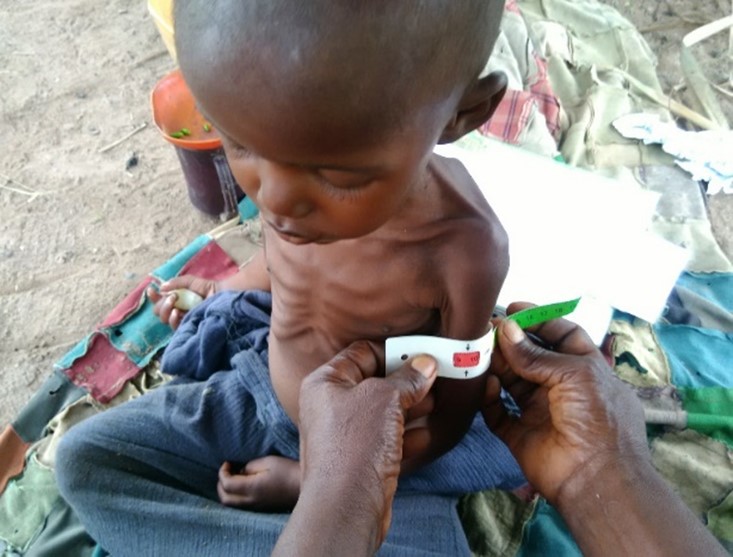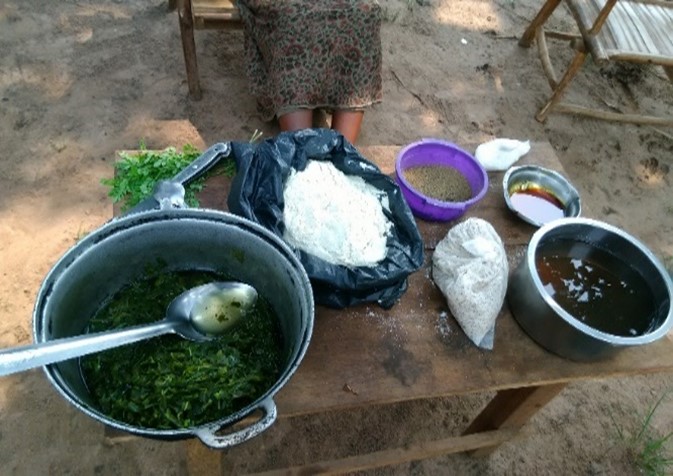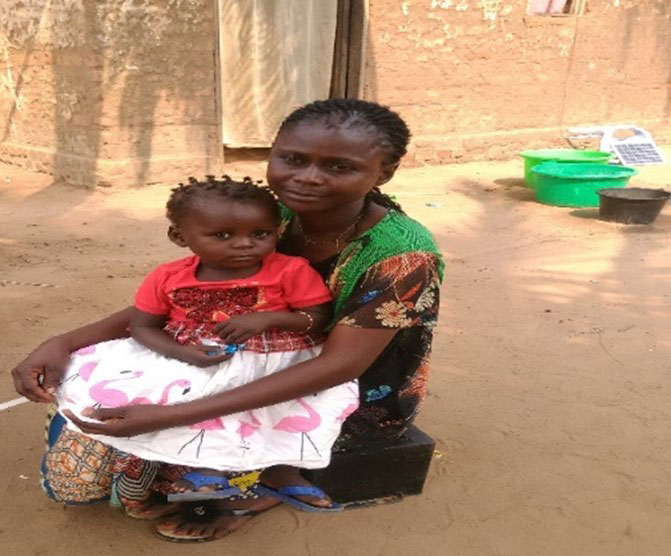A Letter from Larry and Inge Sthreshley, serving in Congo
Fall 2021
Write to Larry Sthreshley
Write to Inge Sthreshley
Individuals: Give online to E200412 for Larry and Inge Sthreshley’s sending and support
Congregations: Give to D505045 for Larry and Inge Sthreshley’s sending and support
Churches are asked to send donations through your congregation’s normal receiving site (this is usually your presbytery)
Subscribe to our co-worker letters
Dear friends,
There are a lot of challenges with the nutrition work I do here in the Dem. Rep. of Congo, but it always gives me a lot of joy and encouragement when I receive a story of a family that has been helped by the programs we undertake. So, I want to share this story of Anastasie Awokana with you.
Anastasie was emaciated and had an arm circumference measurement of only 9 cm when she arrived at Mamu Wetu Health Center for evaluation and treatment on June 30, 2021. The community health volunteer, Mama Lyly (pronounced Lily), had discovered her condition during an intensive systematic screening of children under five years of age in her neighborhood in Katoka, a peri-urban area of Kananga. She immediately referred Anastasie and her mother to Mamu Wetu Health Center so that Anastasie could be evaluated by a nurse.
The head nurse, Jean Pierre, found that Anastasie had a fever, and she tested positive for malaria. She was treated for malaria and later given a de-worming treatment. He reviewed her records and noted that Anastasie was completely vaccinated. She had received Vitamin A and Mebendazole treatment in the last six months but had not been brought in regularly for quarterly preschool consultations at the health center and was not sleeping under a mosquito net.
Jean Pierre learned that Anastasie’s mother, Mama Ndolo, had recently undergone a surgical intervention. Mama Ndolo was a housewife with eight children to care for and her husband, Papy, was a day laborer. With limited means and a large family to care for, the surgery had destabilized their family. Anastasie had first fallen ill with a fever, followed by diarrhea that had contributed to her advanced state of malnutrition. Her parents had given up hope that she would recover as no therapeutic food (Plumpy Nut) was available at the health center. But the nurse, Jean Pierre, encouraged them to use local foods and accept the follow-up and counsel of a community health volunteer. He established a home visit form for Anastasie. He assigned Mama Lyly to visit Anastasie’s family to show them how to make an enriched porridge with local ingredients and share best nutrition and health practices.Mama Lyly visited Anastasie’s family five times over a two-month period to check on Anastasie. She measured and recorded her arm circumference at each visit and shared key nutrition messages with the family. She showed them how to enrich the child’s porridge using cornmeal, adding peanut or caterpillar powder for protein, and the nutrient-rich water from cooked greens and red palm oil to add vitamins and minerals. She gave Mama Ndolo a MUAC measuring tape and taught her how to use it to track Anastasie’s progress herself. Over the course of two months, Anastasie’s arm circumference readings went from 9 cm to 13.20 cm, and her weight increased from 6 kg to 13 kg.
Mama Dolo and her husband were extremely happy to see Anastasie regain her health. Mama Dolo is now in an infant and young child feeding support group. She has started sharing with other mothers in the community how to prevent malnutrition and feed malnourished children with local foods without having to wait for Plumpy Nut. She has asked for photos of Anastasie’s before and after pictures so she can share her story with other households.
Back at the health center, the nurse Jean Pierre talked about the advantages of the intensive systematic screening introduced by the Appui au Système de Santé en RDC (ASSR) project, which in English translates as Health Systems Support in DRC. This screening approach aims to screen every child between six and 59 months every quarter through community health workers (RECOs) and the infant young child feeding support groups they establish. “The advantage of the intensive systematic screening and the micro screening plans,” he said, “is that they involve 33 community groups, each with an active RECO and infant young child feeding support groups. It ensures coverage of the entire peri-urban health zone.”
Intensive systematic screening is also a “doorway into each household” to share nutrition messages targeted to the age of the children in the household and pregnant and nursing women. This approach has improved the proportion of children screened, the prevalence rate and the recovery rate. Over 96% of the children under five years of age have been screened in the Katoka health zone for the past three quarters. The prevalence rate for acute malnutrition in Mama Lyly’s neighborhood has dropped from 24% in January 2020 to 2.5% in June 2021.
Jean Pierre thanked the ASSR project for strengthening the capacity of the community health volunteers (RECOS), the members of the infant and young child feeding support groups, and the health care providers like himself through the ASSR nutrition component.
Isn’t that an encouraging story! I’m pleased to share that we are seeing significant reductions in acute malnutrition in all the 40 health zones supported by ASSR using this approach. Thank you for your financial support and prayers. I hope you will continue on this journey with Larry and me as we work within the framework of the national health system and help bring support to the numerous Protestant, Catholic, and government health centers that are a part of the health care system of the DRC, serving families like Anastasie’s.
God’s blessings,
Inge
Please read the following letter from Sara P. Lisherness, the interim director of World Mission:
Dear partners in God’s mission,
I don’t know about you, but daily my heart grows heavier. News about the pandemic, wars, wildfires, gun violence, racism, earthquakes and hurricanes cloud my vision. It’s hard to see hope; our world is in a fog. Yet we trust that God’s light and love transcend the brokenness of this time.
God is at work transforming the world, and you, through your prayers, partnership and encouragement, are helping us share this good news. Thank you for your faithful and gracious support of our mission personnel.
How can we see through the fog? What will the church be after the pandemic? Could it be that God is doing “a new thing” and is inviting us to perceive it? Through all the uncertainty we know that God’s steadfast love and care for all creation will prevail and that God’s Spirit is at work in each of us.
We all have an integral part to play in fulfilling God’s mission. As we seek to grow together in faithfulness there are three important steps I invite you to take in supporting our shared commitments to God’s mission:
Give – Consider making a year-end financial contribution for the sending and support of our mission personnel. Your support helps mission personnel accompany global partners as together they share the light of God’s love and justice around the world. Invite your session to include support for mission personnel in its annual budget planning.
Act – Visit The Mission Yearbook for Prayer and Study to delve deeper into the work God is doing through the PC(USA) and its partners in ministry around the globe: pcusa.org/missionyearbook.
Pray – Include our mission personnel, our global partners, and our common commitments to share God’s grace, love, mercy and justice in your daily prayers.
Thank you for your faithfulness to God’s mission through the Presbyterian Church. It is my prayer that you will continue to support this work with your prayers, partnership, and financial gifts in the coming year. We hope you will join us and our partners in shining a beacon of hope throughout the world.
In the light of hope,

Sara P. Lisherness, Interim Director
World Mission
Presbyterian Mission Agency
Presbyterian Church (U.S.A.)
To give please visit https://bit.ly/PCUSAmission
You are the light of the world. A city built on a hill cannot be hid. No one after lighting a lamp puts it under the bushel basket, but on the lampstand, and it gives light to all in the house. In the same way, let your light shine before others, so that they may see your good works and give glory to your Father in heaven. Matthew 5:14-16
![]() You may freely reuse and distribute this article in its entirety for non-commercial purposes in any medium. Please include author attribution, photography credits, and a link to the original article. This work is licensed under a Creative Commons Attribution-NonCommercial-NoDeratives 4.0 International License.
You may freely reuse and distribute this article in its entirety for non-commercial purposes in any medium. Please include author attribution, photography credits, and a link to the original article. This work is licensed under a Creative Commons Attribution-NonCommercial-NoDeratives 4.0 International License.
Tags: Appui au Système de Santé en RDC (ASSR Project), childhood malnutrition, community health workers (RECOs), congo, Health Systems Support in DRC, infant young child feeding support groups, intensive systematic screening, Mamu Wetu health center, Matthew 25, MUAC measuring tape, Plumpy Nut
Tags: Larry and Inge Sthreshley


